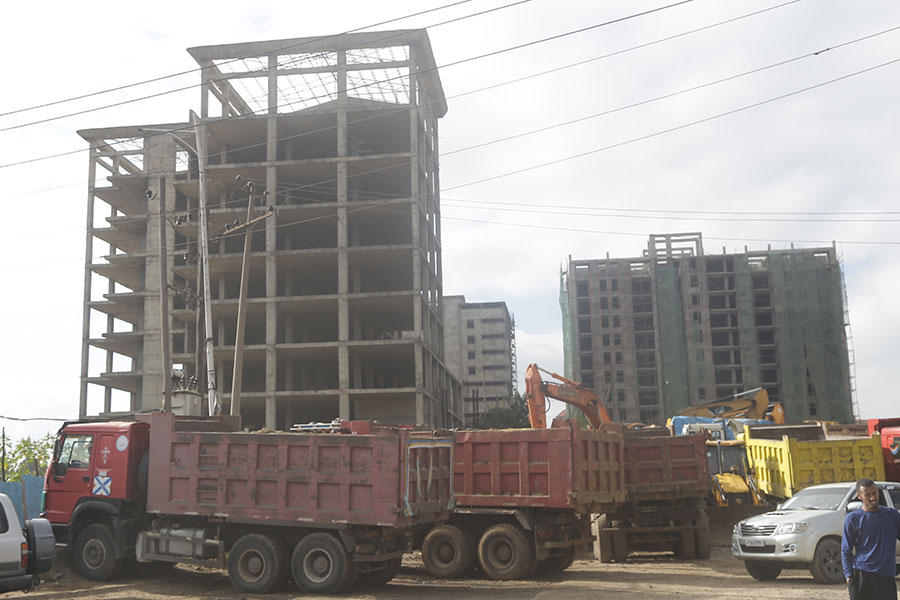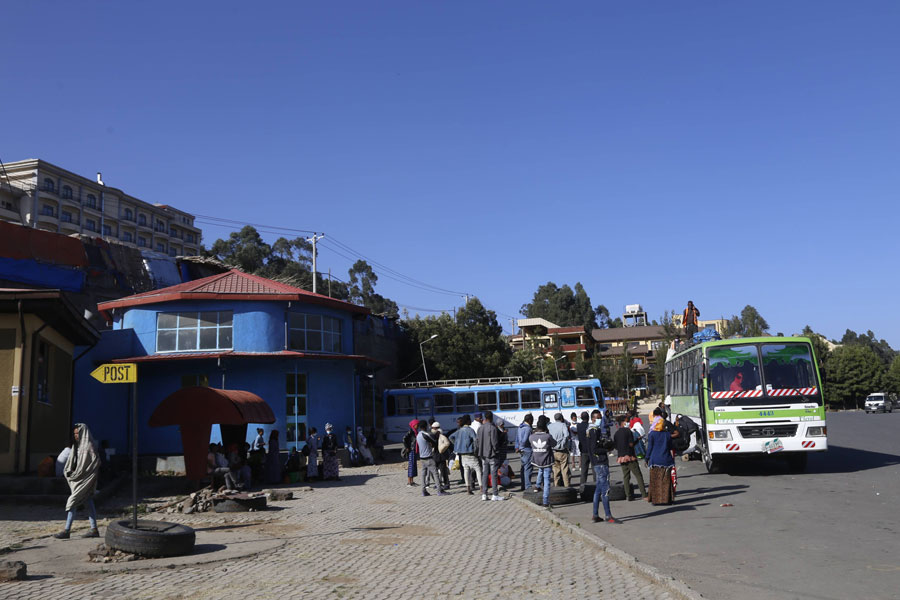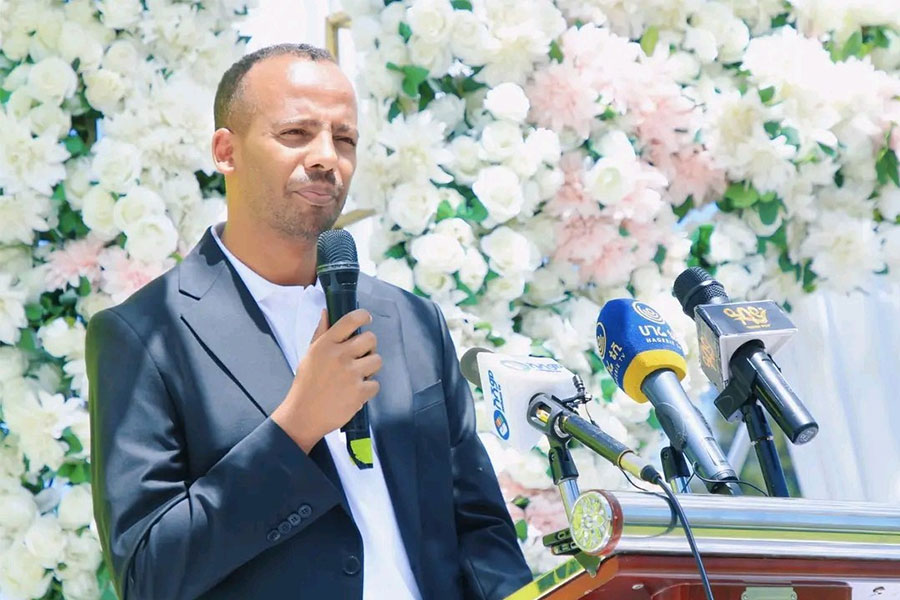
Commentaries | Oct 02,2021
Sep 6 , 2020.
A research and polling institute took to the airwaves by storm late last month with a rare survey in which public sentiments over politically controversial issues were measured. With the promise of a margin of error of two percent, a survey of 2,400 Ethiopians conducted a couple of months back by Afrobarometer has revealed findings that may help shed light on the “public mood.”
Standing on its own, since such polling and statistical data to inform policymaking is rare, it would be hard to claim that this indeed is reflective of public sentiment. Some of the questions were also somewhat vague. Positive responses to designating an additional working language for the federal government do not say much, as it is not clear which would be added. Support or opposition to the contentious Article 39 of the Constitution does not reveal much, as long as the distinction between the “right to self-determination” and “right to secession” have not been defined, and the latter remains a great deal more controversial.
More interesting though was the response the survey received. Opposing groups of the political aisles saw it as a vindication of their respective views and causes. Some found proof that the multinational character of the state had been accepted in the eyes of the public given preferences to keep Article 39. Others saw the positive responses to amending the Constitution as cues that the current form of the state has not gained broader acceptance.
Once again, an issue was co-opted and made to serve political agendas of competing and often contradicting narratives. A multidimensional survey on political preferences was stripped down into the binary of good or bad and used as a tool to attack opponents. Straw man arguments, "whataboutisms", ad hominems and double standards have become the weapons of choice in politics. This is while scapegoating economic and political challenges on the backs of political opponents and portraying it as an element in a grand conspiracy. None are innocent in this modus operandi.
Manifesting this culture of engagement on the streets are the protests by the Ethiopian diaspora communities. Many of the protests have been peaceful. But there have also been sideshows that devolved into violence and increasingly recurrent uses of violent rhetoric against groups and communities. These occurrences should not be used to discredit the diaspora community’s engagement in Ethiopia’s politics; but, the fact that such tactics have come to be utilised is emblematic of what lies in the underbelly of political engagement. More so, these are mirror images of the polarisation and intolerance in society and demonising political culture of the various forces prevalent in Ethiopia.
The political opposition is feeble in checking the neo-patrimonial behaviour of those holding state power. Prime Minister Abiy Ahmed’s (PhD) administration should share as much guilt in the state of disorganisation in which the opposition finds itself. But the style of engagement seems to have been endorsed by the various leaders of the opposition as the only legitimate means of advancing interests. It is conspiratorial, ill-intentioned and selectively outraged. Each side of the opposition has come to reserve the benefit of the doubt for the government at the expense of the other. It is only under such circumstances that the administration tends to get notes of disapproval from each side only in shifts. It is a kind of engagement in binary, utilising endless either/or constructions that are opportunistic, as well as free of context and consistency.
This is by no means a new phenomenon in Ethiopia’s politics. With talking points already chosen and ossified at least two generations ago, demographic changes, class dynamics, rapid urbanisation and the contributions of political changes in 1974 and 1991 seem to have had little impact informing the national discourse.
Understandably, as unfortunate as it may sound, this phenomenon is in response to making use of tried tactics to mobilise supporters. There is nothing like the "other" and the spectre of a hidden enemy to incense supporters. It becomes very easy to claim anything against opponents once they are portrayed as irredeemably bad and their movements are characterised as inherently exclusivist. What follows is the creation of competing narratives, both of which hold falsehoods. It is the unfolding of a political battle designed not to impress and persuade the electorate to win elections. It is warfare in another form. The outcome is mutual deprivation of legitimacy to one another.
This is why disputes over boundaries are hard to resolve, which can serve as a convenient allegory to the contestations for historical accounts and the political scores that follow. One party claims that its possession of a piece of land at one time gives it ownership. The contending party reverts to a different time in history, which it says gives it full rights. Both sides have brought their selected “facts” to the table and deny the legitimacy of the other. Such disputes are impossible to resolve unless one party overpowers the other and forces it to accept its version of the truth - contemporary Ethiopian politics in a nutshell.
Such level of extreme polarisation in social forces and the toxic nature of their engagements - and the loss they cause to lives - comes as a result of weak constitutional institutions whose legitimacy to arbitrate contestations for power has been damaged. These institutions have been instrumentalised to advance and protect the partisan interests of those in power. The acts of violence that have often attended Ethiopia's politics and successive regimes' futile determinations for hegemony at the expense of their opponents have normalised such toxic engagement. It is often too hard to blame the contending groups for assuming that their opponents are out to destroy them instead of engaging them. They feel that either they put into question the legitimacy and right to exist of their rivals and box them into convenient stereotypes or suffer the same fate themselves.
Both characterise their activities not as aggression but as a form of defence. Again, this is war in another form.
The capture of state power for the advancement of in-group interests further exacerbates this behaviour. The more insecure the opposition is made to feel, the more likely it begins to resort to obfuscation and extremism, hoping to balance the power disparities.
This may not absolve the opposition from behaving the way it does now. But it is a powerful reminder of where responsibilities mainly lie - with the custodians of state power.
It is apparent now that the state is going through so much, struggling to deliver public goods in security and justice. The Ethiopian state is going through a period where it loses the "capacity, accountability, or legitimacy to mediate relations between citizen groups and between citizens and the state," making it vulnerable to recurrent violence. The World Bank defines such states as "fragile states."
Indeed, the landscape has now degenerated into a political marketplace. There is a desperate need to help it evolve to common-interest state engagement to reach a comprehensive political settlement, an idea that has remained elusive ever since the formation of the Ethiopian "modern" state.
PUBLISHED ON
Sep 06,2020 [ VOL
21 , NO
1062]

Commentaries | Oct 02,2021

Viewpoints | Apr 24,2021

Agenda | Nov 12,2022

Radar | Dec 05,2018

Viewpoints | Jan 21,2023

Radar | Jul 21,2024

My Opinion | Nov 09,2024

Fortune News | Jul 31,2021

Commentaries | Jan 11,2020

Radar | Apr 27,2025

My Opinion | 131970 Views | Aug 14,2021

My Opinion | 128359 Views | Aug 21,2021

My Opinion | 126297 Views | Sep 10,2021

My Opinion | 123913 Views | Aug 07,2021

Dec 22 , 2024 . By TIZITA SHEWAFERAW
Charged with transforming colossal state-owned enterprises into modern and competitiv...

Aug 18 , 2024 . By AKSAH ITALO
Although predictable Yonas Zerihun's job in the ride-hailing service is not immune to...

Jul 28 , 2024 . By TIZITA SHEWAFERAW
Unhabitual, perhaps too many, Samuel Gebreyohannes, 38, used to occasionally enjoy a couple of beers at breakfast. However, he recently swit...

Jul 13 , 2024 . By AKSAH ITALO
Investors who rely on tractors, trucks, and field vehicles for commuting, transporting commodities, and f...

Jul 6 , 2025 . By BEZAWIT HULUAGER
The federal legislature gave Prime Minister Abiy Ahmed (PhD) what he wanted: a 1.9 tr...

Jul 6 , 2025 . By YITBAREK GETACHEW
In a city rising skyward at breakneck speed, a reckoning has arrived. Authorities in...

Jul 6 , 2025 . By NAHOM AYELE
A landmark directive from the Ministry of Finance signals a paradigm shift in the cou...

Jul 6 , 2025 . By NAHOM AYELE
Awash Bank has announced plans to establish a dedicated investment banking subsidiary...